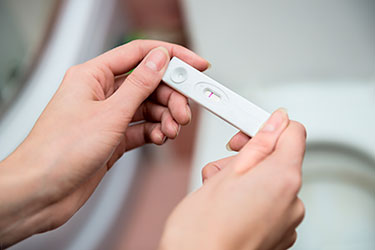
Is your period late? Wondering if you’re pregnant or if it’s all in your head? Don’t worry, you’re not alone. Let’s figure it out together. Here’s how to tell if you’re really pregnant and what symptoms you can expect in the first few weeks of pregnancy.
How Do I Know if I Am Actually Pregnant?
The only way to know for sure is to take a pregnancy test. You can purchase an over-the-counter home pregnancy test from most drugstores. These tests involve urinating on a small test strip. The test measures the presence of the pregnancy hormone, human chorionic gonadotrophin (hCG), in your body. If the hormone is present, a positive result will show up in the test result window. Read the instructions carefully before performing the test to get the most accurate results. The test will still work even if you are taking hormonal birth control.
If you would like an accurate confirmation of your test results or are simply just too nervous to take the test on your own, you can come to the Pregnancy Help Center for a free and confidential pregnancy test. At our clinic, you can take a pregnancy test in an understanding, friendly, caring atmosphere with no pressure or judgment.
When Should I Take a Pregnancy Test?
Most Home pregnancy tests are accurate after you have missed your period. The pregnancy hormone takes time to build up in your body, so it’s best to wait until after you’ve missed your period to test. If you test before that, the test may come up negative even if you are actually pregnant.
Let this pregnancy calculator do the math for you:
If you have irregular periods, or can’t remember when your last period was, you should wait at least two weeks after you had sex to test.
How Do I Know If I Am Pregnant Without a Test?
The anxiety around taking a pregnancy test may drive you to try the multitude of pregnancy quizzes available online. Remember that there are no 100% accurate online pregnancy tests. The best way to know if you are pregnant is to take a physical pregnancy test. However, you can reasonably speculate that you are pregnant by paying attention to certain changes in your body that could be early signs of pregnancy.
Early Signs of Pregnancy
Pregnancy symptoms can start even before you miss your period. While there are some common early signs to look out for, it’s important to note that every pregnancy is different, and you may not feel any of these things.
The most common signs at the beginning of pregnancy include:
- A missed period: This is the most obvious sign of pregnancy. If your period is over a week late, it’s possible that you’re pregnant. However, this symptom might not be accurate if you have irregular menstrual cycles.
- Nausea: This is often referred to as morning sickness, although it can occur any time during the day or night. The nausea may or may not be accompanied by vomiting, and its severity varies from person to person.
- Fatigue (feeling tired): Can’t keep your eyes open? It’s normal to feel extremely tired during the first few weeks of pregnancy.
- Tender, swollen breasts: You may experience tingling, aching, and swelling of the breast tissue. You may also notice darkening of the areas surrounding the nipples.
- Frequent urination: If you’re making more frequent trips to the bathroom, you might be pregnant. Your body is producing more blood, causing your kidneys to filter more fluid and produce more urine.
Some other unusual signs you may experience are:
- Mood swings: It’s natural to feel more emotional and to have mood swings while pregnant.
- Light spotting or bleeding: Also known as implantation bleeding, it occurs when the fertilized egg attaches to the uterine wall. Compared to a regular menstrual period, you will notice a smaller amount of bleeding for a shorter time.
- Cramping and pain: You might have cramps similar to what you might feel when you’re getting your period. Contact your healthcare provider immediately if your cramps are severe or only on one side of your body; it could be a sign of an ectopic pregnancy or other complication.
- Headaches: Headaches, dizziness, and lightheadedness are normal during early pregnancy.
- Sensitivity to smell: A commonly reported symptom and one of the causes of nausea during this time.
- Change of appetite: Changing hormone levels could cause you to find some foods off-putting and to crave other kinds of food. You may also find yourself feeling extra hungry at times .
- Constipation and bloating: If you’ve had fewer than three bowel movements in a week, you could be dealing with pregnancy constipation.
- Heartburn/indigestion: Hormones cause the muscles in your food pipe and stomach to relax, causing heartburn and indigestion. You might feel a burning pain in your chest or discomfort in your upper abdomen.
You should see an OB/GYN if you experience the following:
- Lower back pain
- Any kind of vaginal bleeding
- Any persistent headaches that do not resolve with Tylenol
What Do I Do Now?
The uncertainty of an unexpected pregnancy can be scary and isolating. You shouldn’t have to go through this time in your life alone. We’re here to help. Give us a call, chat with us through LiveChat, or make an appointment with us to talk about your options. A Client Advocate will listen to your feelings and concerns and a Registered Nurse can answer your medical questions.
Don’t like reading? Watch our video on pregnancy symptoms here.